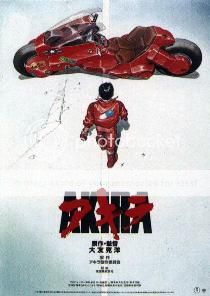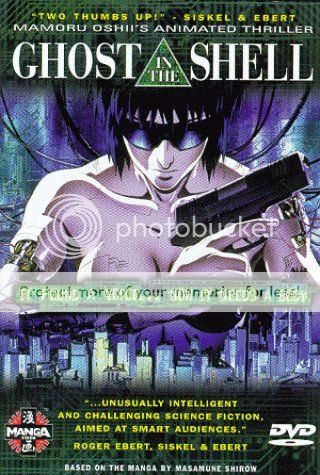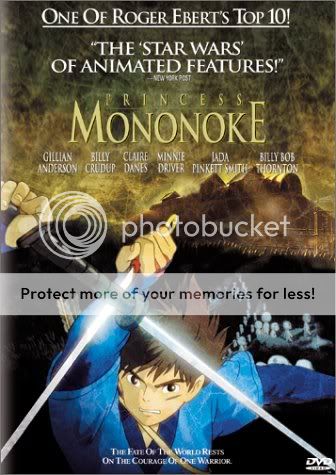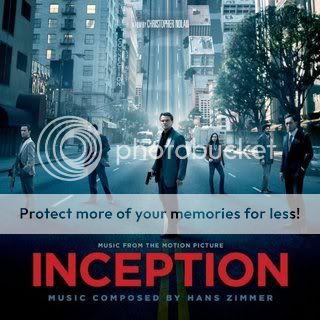"Copycating", AKA When Hollywood "Plagiarizes" Anime
Sometimes, I think Otakudom has a wrench up its rear when it comes to its outlook on the West.
To be fair, I’m not saying every Otaku is a blind bigot. But when you have a fandom that thinks dubbing its shows in English is a sin against nature, acts like Western animation is an abomination and claims that Hollywood has nothing on their precious anime, it’s clear that they’re living in Lalaland. Because one of the reasons I’m hesitant to identify with Otaku culture is due to its like-minded arrogance. Well…that, and its obsession with perverting everything through hentai and ecchi, but that’s for another day…
This leads to one of the most commonly-used, or misused, claims out there: that Hollywood keeps ripping off anime because of its lack of ideas. For one, you could say the same about anime, especially since Faye Valentine, one of the characters in Cowboy Bebop, takes plenty of inspiration from Mathilda in Leon: The Professional. But for another, it completely ignores how being a “copycat” has no bearing on quality. Darren Aronofsky, for example, was a big fan of Satoshi Kon and even reused scenes from the late director’s films in some of his own, and yet Aronofsky is one of Hollywood’s greatest thriller directors today. “Copycating”, as I call it, is an idea, and in some cases the copycat can even hold a candle, or surpass, the original in quality.
So, here are 5 examples of anime, in this instance films, that have inspired Hollywood classics, as per their director’s claims/indirect similarities, and whether or not I think that they’re as good as/better than the originals. Be prepared for some controversial opinions and spoilers.
We’ll begin this with an easy comparison. Josh Trank, the director of Chronicle, has stated he took inspiration, amongst other places, from Katsuhiro Otomo’s classic with his 2012 found-footage film. And it’s easy to see similarities, as both feature a simple teenager with a shady past who winds up with superhuman powers, goes crazy, is confronted by one of his long-time friends and, ultimately, dies in a horrific way. The two have differences, Akira is more over-the-top and sci-fi in execution, but their basic templates of “absolute power corrupts absolutely” are the same. So, naturally, Chronicle is the live-action “rip-off”.
But there’s a problem with using that to demean quality, namely that Akira hasn’t aged all that well. Sure, it’s pretty to look at, the visuals are trippy and the level of background detail rivals modern Studio Ghibli, but its story, what little there is, isn’t that compelling. It’s more of a catalyst to see how violent and over-the-top its gore and action are so as to earn its R-rating, as opposed to a thought-provoking and timeless tale about corruption, power and whatever it forcefully crams into its 125-minute runtime. Plus, its subtext, about the youth of 80’s Japan taking everything for granted, is both not well-executed and dated. Even Grave of the Fireflies, which attempted the same message, was done more subtly and still works as a compelling drama about the horrors of war without it. Akira, in contrast, is gore porn, hence failing to stay relevant 27 years later.
In contrast, Chronicle has a beautifully-written story that makes the film timeless. Instead of being a catalyst for violence, the film keeps the gore to a minimum until the third-act where it’s relevant. And even then it’s restrained, focusing on the dynamic between the protagonist and his cousin. Speaking of which, Andrew has a believable and emotional back-story. Unlike Tetsuo, whose past is tacked on and rushed, you get a sense of who Andrew is as a character, what his family life is like and why he turns out the way he does. And the movie is only an hour-and-a-half, making it quick and easy to sit through. For those reasons, I consider Chronicle to be superior.
On a more technical side, you have two movies, both from different parts of the world, that played an important part in revolutionizing their respective mediums. In the former’s case, you have a movie that brought the “existentialist, dystopian future where everything is state controlled” concept to anime. In the latter’s case, you have a movie that brought the “existentialist, dystopian future where everything is mind hacked” concept to Hollywood. Both are relatively similar in their takes on free-will and whether you really have control of your destiny, such that the directors of the latter, the Wachowskis, have openly admitted to being inspired by the former.
That’s all fine and dandy, but does that mean that The Matrix is automatically inferior? Not necessarily. For all its flaws, the movie uses state of the art technology for its action scenes, including techniques like bullet-time, 360-degree turns and slow-motion fight choreography. Which is all the better because, honestly, its story component is awkward and littered with excessive philosophy, such to the point where its characters are walking exposition and not actual people. The themes aren’t any less interesting, but it definitely doesn’t help.
All the more reason I should point out how much worse it is in Ghost in the Shell. For all its problems with pacing, The Matrix still engaged with thrilling set pieces and action in its third-act. In contrast, Ghost in the Shell made most of its third-act into an exposition heap that showed the dynamic between the villain and the protagonist. Which’d be fine…if it were interesting. Yet so much of the movie is already drawn out exposition that it’s boring and painful to sit through. And for a movie that’s only 90-something minutes long, that’s not good. So while I don’t think either movie has aged well, I prefer The Matrix because I feel it’s aged better.
Now we arrive at one of the more controversial comparisons. In truth, this one is more blatantly obvious than the two prior, namely because Darren Aronofsky has openly admitted to purchasing the North American rights for Perfect Blue so he can remake certain scenes from it in his own work. Outside of that, both films feature a protagonist struggling to make big in a tough profession while also simultaneously going insane. Both are movies that take advantage of that premise to deliver thrills and suspense, and both have their protagonists confront their psychosis in the third-act to varying degrees of success. And both are held in high-regard by their fans, with Black Swan earning its lead an Oscar. Surely, there’s an argument to be made about copycating.
But here’s the catch: both movies are more different than similar. Perfect Blue is a murder mystery story, while Black Swan is about the stresses of perfection. Perfect Blue focuses on TV and music, while Black Swan focuses on ballet. Perfect Blue is a cautionary tale about the dangers of obsessing over an image, while Black Swan is a cautionary tale about what that image can do to your psyche. And finally, Perfect Blue doesn’t hold up as a movie, while Black Swan does.
Yeah, I’ve made no secret that I’m not a fan of Perfect Blue, but it really doesn’t work in my eyes. The pacing is wonky, its themes blatantly contradict what it wants to convey and the real perpetrator is so obvious you’d have to be high not to notice. Plus, that third-act twist. It’s so bad and out of left-field that it actively undoes everything else prior. I’ve seen plenty of movies with bad twists, but that one makes me hate the movie in retrospect. Black Swan, while no doubt weird, is competent on all levels, so I consider it the superior.
And then we get to the monkey wrench that completely throws everything off. This is an interesting comparison in that it’s not direct, as it’s never been confirmed outside of some basic-yet-passing similarities. That, and Avatar has been more-frequently compared to Ferngully, which is suddenly a classic now, Pocahontas, which has gained hipster love in recent years, and Dances with Wolves, which I’m pretty sure is an entirely different genre, than it has Hayao Miyazaki’s 1997 masterpiece. Regardless, the comparisons have been made, so I guess I should see if they hold weight. Here goes.
For starters, it’s no contest: Princess Mononoke wins. While I have a legit, un-ironic fondness for Avatar, a fact helped by it being competent, (you heard that right!) it’s as subtle as a brick to the head, its conflict clearly spelled out and its characters black-and-white. Plus, like James Cameron’s previous movies, its script and acting are really corny, with the actors and actresses giving B-list performances. And its message is incredibly blunt. It’s a ‘“save nature from humanity” story to a teat, no ifs-and-or-buts, which can be distracting.
Which is all the more reason Princess Mononoke wins this time, as it has all the elements of an environmental film, but it’s actually subtle. There’s no clear right-or-wrong, no real villain and no true answer to the conflict. And while the movie ends with nature winning out, it’s never shoved in your face that there’s a clear victor. It’s possible that it could even start again, and that casualties, while awful, are inevitable. The movie is multi-faceted and layered, essentially, hence why, in this instance, it’s the superior product.
Finally, the most-difficult comparison. I’ve already covered this in V4 of ScrewAttack, but since the blog is gone I can’t dig up my points for reference. And for good cause, as Inception was in production for a decade, so its relationship with the late-Satoshi Kon’s final film is faulty. Still, Christopher Nolan has indirectly credited the movie as being an influence for some of his imagery, so I have to mention it. It’s only fair considering both films tackle the human subconscious.
But there’s a problem, as the movies diverge heavily beyond the “human subconscious” part. In Paprika, the human psyche is a direct catalyst for a brain heist caper that keeps you guessing. In Inception, the human psyche is a side-point to the main story of trying to find your identity in a not-so-clear set of circumstances. Also, it’s a spy movie. And the two are so different in their plotting that comparing them is nigh-irrelevant, especially since Nolan has cited other influences too.
Additionally, I’m not a big fan of Paprika anyway. Not because I think it’s the worst of Kon’s films, I don’t, but because it embodies everything I don’t really care for about Kon in general: complicated scenarios, twists for the sake of twists, a lack of focus in favour of unusual visuals, to name a few. Say what you will about Inception, but it at least had a consistent focus. It played everything straight and simple, something Paprika didn’t do. Also, it didn’t try to gross you out with its twists, which is something Paprika did at one point. So while both films are interesting, in the end I think Inception is superior.
Of course, with all this praise of Hollywood, you’d think I’m being a hypocrite for criticizing Otaku culture. But I’m not, as the real issue is whether or not using the term “copycat” is an excuse for dismissing quality. As I stated above, I greatly respect these 5 copycats for making legit movies, as opposed to simply copying and making uninspired products. You can argue quality, superiority or any such argument, but does it really matter? Or is it an excuse to disregard Hollywood?
Anyway, something to think about.
To be fair, I’m not saying every Otaku is a blind bigot. But when you have a fandom that thinks dubbing its shows in English is a sin against nature, acts like Western animation is an abomination and claims that Hollywood has nothing on their precious anime, it’s clear that they’re living in Lalaland. Because one of the reasons I’m hesitant to identify with Otaku culture is due to its like-minded arrogance. Well…that, and its obsession with perverting everything through hentai and ecchi, but that’s for another day…
This leads to one of the most commonly-used, or misused, claims out there: that Hollywood keeps ripping off anime because of its lack of ideas. For one, you could say the same about anime, especially since Faye Valentine, one of the characters in Cowboy Bebop, takes plenty of inspiration from Mathilda in Leon: The Professional. But for another, it completely ignores how being a “copycat” has no bearing on quality. Darren Aronofsky, for example, was a big fan of Satoshi Kon and even reused scenes from the late director’s films in some of his own, and yet Aronofsky is one of Hollywood’s greatest thriller directors today. “Copycating”, as I call it, is an idea, and in some cases the copycat can even hold a candle, or surpass, the original in quality.
So, here are 5 examples of anime, in this instance films, that have inspired Hollywood classics, as per their director’s claims/indirect similarities, and whether or not I think that they’re as good as/better than the originals. Be prepared for some controversial opinions and spoilers.
1. Akira (1988) VS Chronicle (2012):
VS
We’ll begin this with an easy comparison. Josh Trank, the director of Chronicle, has stated he took inspiration, amongst other places, from Katsuhiro Otomo’s classic with his 2012 found-footage film. And it’s easy to see similarities, as both feature a simple teenager with a shady past who winds up with superhuman powers, goes crazy, is confronted by one of his long-time friends and, ultimately, dies in a horrific way. The two have differences, Akira is more over-the-top and sci-fi in execution, but their basic templates of “absolute power corrupts absolutely” are the same. So, naturally, Chronicle is the live-action “rip-off”.
But there’s a problem with using that to demean quality, namely that Akira hasn’t aged all that well. Sure, it’s pretty to look at, the visuals are trippy and the level of background detail rivals modern Studio Ghibli, but its story, what little there is, isn’t that compelling. It’s more of a catalyst to see how violent and over-the-top its gore and action are so as to earn its R-rating, as opposed to a thought-provoking and timeless tale about corruption, power and whatever it forcefully crams into its 125-minute runtime. Plus, its subtext, about the youth of 80’s Japan taking everything for granted, is both not well-executed and dated. Even Grave of the Fireflies, which attempted the same message, was done more subtly and still works as a compelling drama about the horrors of war without it. Akira, in contrast, is gore porn, hence failing to stay relevant 27 years later.
In contrast, Chronicle has a beautifully-written story that makes the film timeless. Instead of being a catalyst for violence, the film keeps the gore to a minimum until the third-act where it’s relevant. And even then it’s restrained, focusing on the dynamic between the protagonist and his cousin. Speaking of which, Andrew has a believable and emotional back-story. Unlike Tetsuo, whose past is tacked on and rushed, you get a sense of who Andrew is as a character, what his family life is like and why he turns out the way he does. And the movie is only an hour-and-a-half, making it quick and easy to sit through. For those reasons, I consider Chronicle to be superior.
2. Ghost in the Shell (1995) VS The Matrix (1999):
VS
On a more technical side, you have two movies, both from different parts of the world, that played an important part in revolutionizing their respective mediums. In the former’s case, you have a movie that brought the “existentialist, dystopian future where everything is state controlled” concept to anime. In the latter’s case, you have a movie that brought the “existentialist, dystopian future where everything is mind hacked” concept to Hollywood. Both are relatively similar in their takes on free-will and whether you really have control of your destiny, such that the directors of the latter, the Wachowskis, have openly admitted to being inspired by the former.
That’s all fine and dandy, but does that mean that The Matrix is automatically inferior? Not necessarily. For all its flaws, the movie uses state of the art technology for its action scenes, including techniques like bullet-time, 360-degree turns and slow-motion fight choreography. Which is all the better because, honestly, its story component is awkward and littered with excessive philosophy, such to the point where its characters are walking exposition and not actual people. The themes aren’t any less interesting, but it definitely doesn’t help.
All the more reason I should point out how much worse it is in Ghost in the Shell. For all its problems with pacing, The Matrix still engaged with thrilling set pieces and action in its third-act. In contrast, Ghost in the Shell made most of its third-act into an exposition heap that showed the dynamic between the villain and the protagonist. Which’d be fine…if it were interesting. Yet so much of the movie is already drawn out exposition that it’s boring and painful to sit through. And for a movie that’s only 90-something minutes long, that’s not good. So while I don’t think either movie has aged well, I prefer The Matrix because I feel it’s aged better.
3. Perfect Blue (1997) VS Black Swan (2010):
VS
Now we arrive at one of the more controversial comparisons. In truth, this one is more blatantly obvious than the two prior, namely because Darren Aronofsky has openly admitted to purchasing the North American rights for Perfect Blue so he can remake certain scenes from it in his own work. Outside of that, both films feature a protagonist struggling to make big in a tough profession while also simultaneously going insane. Both are movies that take advantage of that premise to deliver thrills and suspense, and both have their protagonists confront their psychosis in the third-act to varying degrees of success. And both are held in high-regard by their fans, with Black Swan earning its lead an Oscar. Surely, there’s an argument to be made about copycating.
But here’s the catch: both movies are more different than similar. Perfect Blue is a murder mystery story, while Black Swan is about the stresses of perfection. Perfect Blue focuses on TV and music, while Black Swan focuses on ballet. Perfect Blue is a cautionary tale about the dangers of obsessing over an image, while Black Swan is a cautionary tale about what that image can do to your psyche. And finally, Perfect Blue doesn’t hold up as a movie, while Black Swan does.
Yeah, I’ve made no secret that I’m not a fan of Perfect Blue, but it really doesn’t work in my eyes. The pacing is wonky, its themes blatantly contradict what it wants to convey and the real perpetrator is so obvious you’d have to be high not to notice. Plus, that third-act twist. It’s so bad and out of left-field that it actively undoes everything else prior. I’ve seen plenty of movies with bad twists, but that one makes me hate the movie in retrospect. Black Swan, while no doubt weird, is competent on all levels, so I consider it the superior.
4. Princess Mononoke (1997) VS Avatar (2009):
VS
And then we get to the monkey wrench that completely throws everything off. This is an interesting comparison in that it’s not direct, as it’s never been confirmed outside of some basic-yet-passing similarities. That, and Avatar has been more-frequently compared to Ferngully, which is suddenly a classic now, Pocahontas, which has gained hipster love in recent years, and Dances with Wolves, which I’m pretty sure is an entirely different genre, than it has Hayao Miyazaki’s 1997 masterpiece. Regardless, the comparisons have been made, so I guess I should see if they hold weight. Here goes.
For starters, it’s no contest: Princess Mononoke wins. While I have a legit, un-ironic fondness for Avatar, a fact helped by it being competent, (you heard that right!) it’s as subtle as a brick to the head, its conflict clearly spelled out and its characters black-and-white. Plus, like James Cameron’s previous movies, its script and acting are really corny, with the actors and actresses giving B-list performances. And its message is incredibly blunt. It’s a ‘“save nature from humanity” story to a teat, no ifs-and-or-buts, which can be distracting.
Which is all the more reason Princess Mononoke wins this time, as it has all the elements of an environmental film, but it’s actually subtle. There’s no clear right-or-wrong, no real villain and no true answer to the conflict. And while the movie ends with nature winning out, it’s never shoved in your face that there’s a clear victor. It’s possible that it could even start again, and that casualties, while awful, are inevitable. The movie is multi-faceted and layered, essentially, hence why, in this instance, it’s the superior product.
5. Paprika (2006) VS Inception (2010):
VS
Finally, the most-difficult comparison. I’ve already covered this in V4 of ScrewAttack, but since the blog is gone I can’t dig up my points for reference. And for good cause, as Inception was in production for a decade, so its relationship with the late-Satoshi Kon’s final film is faulty. Still, Christopher Nolan has indirectly credited the movie as being an influence for some of his imagery, so I have to mention it. It’s only fair considering both films tackle the human subconscious.
But there’s a problem, as the movies diverge heavily beyond the “human subconscious” part. In Paprika, the human psyche is a direct catalyst for a brain heist caper that keeps you guessing. In Inception, the human psyche is a side-point to the main story of trying to find your identity in a not-so-clear set of circumstances. Also, it’s a spy movie. And the two are so different in their plotting that comparing them is nigh-irrelevant, especially since Nolan has cited other influences too.
Additionally, I’m not a big fan of Paprika anyway. Not because I think it’s the worst of Kon’s films, I don’t, but because it embodies everything I don’t really care for about Kon in general: complicated scenarios, twists for the sake of twists, a lack of focus in favour of unusual visuals, to name a few. Say what you will about Inception, but it at least had a consistent focus. It played everything straight and simple, something Paprika didn’t do. Also, it didn’t try to gross you out with its twists, which is something Paprika did at one point. So while both films are interesting, in the end I think Inception is superior.
Of course, with all this praise of Hollywood, you’d think I’m being a hypocrite for criticizing Otaku culture. But I’m not, as the real issue is whether or not using the term “copycat” is an excuse for dismissing quality. As I stated above, I greatly respect these 5 copycats for making legit movies, as opposed to simply copying and making uninspired products. You can argue quality, superiority or any such argument, but does it really matter? Or is it an excuse to disregard Hollywood?
Anyway, something to think about.










Comments
Post a Comment